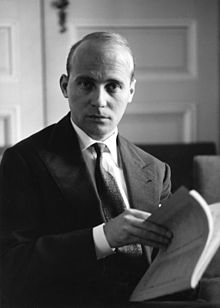L'Upupa und der Triumph der Sohnesliebe
| L'Upupa und der Triumph der Sohnesliebe | |
|---|---|
| Opera by Hans Werner Henze | |

The opera's composer, 1960
|
|
| Translation | The Hoopoe and the Triumph of Filial Love |
| Librettist | Hans Werner Henze |
| Language | German |
| Premiere | 12 August 2003 Salzburg Festival by Deutsche Oper Berlin and Teatro Real |
L'Upupa und der Triumph der Sohnesliebe (English: The Hoopoe and the Triumph of Filial Love) is an opera by Hans Werner Henze with a German libretto by the composer, inspired by Arab and Persian legends. This is Henze's 15th, and self-stated final, opera, and the first where he has written his own libretto.
The opera was first performed at the Salzburg Festival on 12 August 2003 in a co-production with the Deutsche Oper Berlin and the Teatro Real, Madrid, staged by Dieter Dorn, set by Jürgen Rose. For the premiere, the originally scheduled conductor was Christian Thielemann and the original singer scheduled as "The demon" was Ian Bostridge, but in their places, Markus Stenz conducted and John Mark Ainsley sang "The demon".
Critics have noted stylistic allusions to the music of Alban Berg and Igor Stravinsky, as well as to the operas Die Entführung aus dem Serail, The Magic Flute, Die Frau ohne Schatten, Tristan und Isolde and Parsifal.
The role of "the nameless dictator" is unseen and unheard.
Al Radshi, an old man, who lives in a tower on Manda, the island of the black baboons, laments the absence of his golden bird, a hoopoe that used to visit him daily. Al Radshi once reached out to touch the hoopoe, which caused it to fly away. Since then, the bird has not been seen. Al Radshi asks his three sons to go off on a quest to find the hoopoe and return it to him. Two of the sons are untrustworthy and lazy, but the third, Al Kasim, is honest and brave. Al Kasim is the only son to go off in search of the hoopoe.
...
Wikipedia
